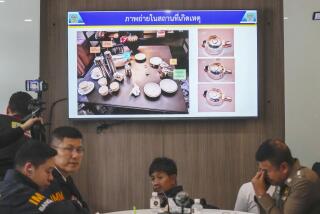Hotel bar may be site of poisoning
- Share via
LONDON — Russian dissident Alexander Litvinenko probably was poisoned at the bar of a hotel here where he met with two other Russians, both of whom now are in hospitals showing symptoms of radiation sickness, health investigators said Friday.
For weeks, investigators had zeroed in on a different location, the Piccadilly Circus sushi restaurant where Litvinenko had lunch, believing that was a likely location for his mysterious poisoning with radioactive polonium-210.
But that theory has been shaken by medical evidence that seven people who worked at the bar of the Millennium Hotel in London’s upscale Mayfair district also have been exposed. The bar has been placed under quarantine.
Police have refused to say where they think the poisoning took place -- a crucial question, because it may be the best clue to who did it, and why. One law enforcement official, speaking on condition of anonymity, said detectives had made no final judgment.
But the medical evidence suggests that the poisoning probably took place at the bar, Dr. Michael Clark of Britain’s Health Protection Agency said Friday in an interview.
“The monitoring of the staff in the Millennium bar was done for public health purposes, but it obviously has implications for the police forensic analysis -- implications of timing, and possible scenarios for the administration of polonium.”
Clark emphasized that he was looking only at medical evidence and not at whatever the police investigation had turned up. But the fact that seven bar employees were exposed was significant, he said, especially since no sushi bar employees, and no hospital employees, have tested positive.
“Given that Mr. Litvinenko had a very significant quantity of polonium-210 administered in some way, there are obvious possibilities that small amounts of that could have been left on, for example, a glass or a table, that subsequently led to employees being exposed. But until there is a proper forensic examination, I really don’t want to speculate on that,” Clark said.
Contacts also sickened
On Nov. 1, Litvinenko met two Russians at the Millennium’s Pine Bar: Andrei Lugovoy, a businessman and former KGB colonel, and a second businessman, Dmitry Kovtun. Russian news organizations reported Friday that Lugovoy, who was a friend of Litvinenko, was in a Russian hospital with apparent radiation damage to several organs. Kovtun is also reported to be seriously ill.
Later that day, Litvinenko went to a London hospital with symptoms of what doctors eventually determined was polonium poisoning. He died Nov. 23.
The former Russian security agent, who had become a critic of the Russian government, told friends he suspected the poisoner could have been one of the two Russians or the man he met at the sushi bar, Italian security consultant Mario Scaramella.
Scaramella also tested positive for exposure to polonium-210, but not in amounts sufficient to sicken him so far. He says he was meeting with Litvinenko to warn him of a possible attempt on his life.
Litvinenko also said he believed the perpetrator, whoever it was, was acting on behalf of the Russian government. Russia has denied that.
A crucial unanswered question is which came first -- lunch at the sushi bar or tea at the hotel. Litvinenko told investigators that he went first to the sushi bar, then to the hotel, a law enforcement source told The Times.
Asked how Scaramella could have been exposed if the poisoning happened at the Pine Bar, some analysts said he could have hugged and kissed Litvinenko upon greeting him. That scenario makes sense only if Litvinenko had already been exposed when he went to the sushi restaurant.
But the contamination of the Pine Bar also could have taken place earlier, the law enforcement source said, pointing out that authorities have called on patrons to seek testing if they were in the bar not only on the day Litvinenko was there, but also the day before and the day after.
Lugovoy, who has been described in the Russian media as the main witness in the case, was reportedly a guest at the hotel before the Nov. 1 meeting.
Traces of polonium-210 have been found in guest rooms at the Millennium as well, the police source said. Investigators also have detected polonium on two British Airways jets, one of which, British press reports said, carried Lugovoy and Kovtun to London.
Timeline in question
Lugovoy, in an interview a week ago with Russia’s Kommersant newspaper, suggested that Litvinenko could have been poisoned long before Nov. 1. He said he and Kovtun met with Litvinenko Oct. 17, in the London offices of the Erinys security company, one of several locations around London where traces of radiation have been found.
“Localized reactive contamination” has also been found in “a couple of rooms” at the Parkes Hotel in London’s Knightsbridge district, health authorities reported Friday. Lugovoy stayed there Oct. 16, and two other hotels where he has stayed have also shown traces of a radioactive substance, according to several British press reports.
Lugovoy, now considered the main witness in the case, told Interfax news agency in Moscow that his condition was satisfactory.
He also said he had doubts about earlier reports that Kovtun, his business partner, was in critical condition. Lugovoy is scheduled to be interviewed today by law enforcement agents, Interfax said.
Russian authorities pledged to cooperate with British investigators who are in Moscow to conduct the inquiry. Russia has opened its own investigation of Kovtun’s poisoning.
Police sources in London said the Russians had not presented more than ordinary obstacles to conducting the investigation.
Times staff writers David Holley in Moscow and Sebastian Rotella in Paris contributed to this report.
More to Read
Sign up for Essential California
The most important California stories and recommendations in your inbox every morning.
You may occasionally receive promotional content from the Los Angeles Times.









